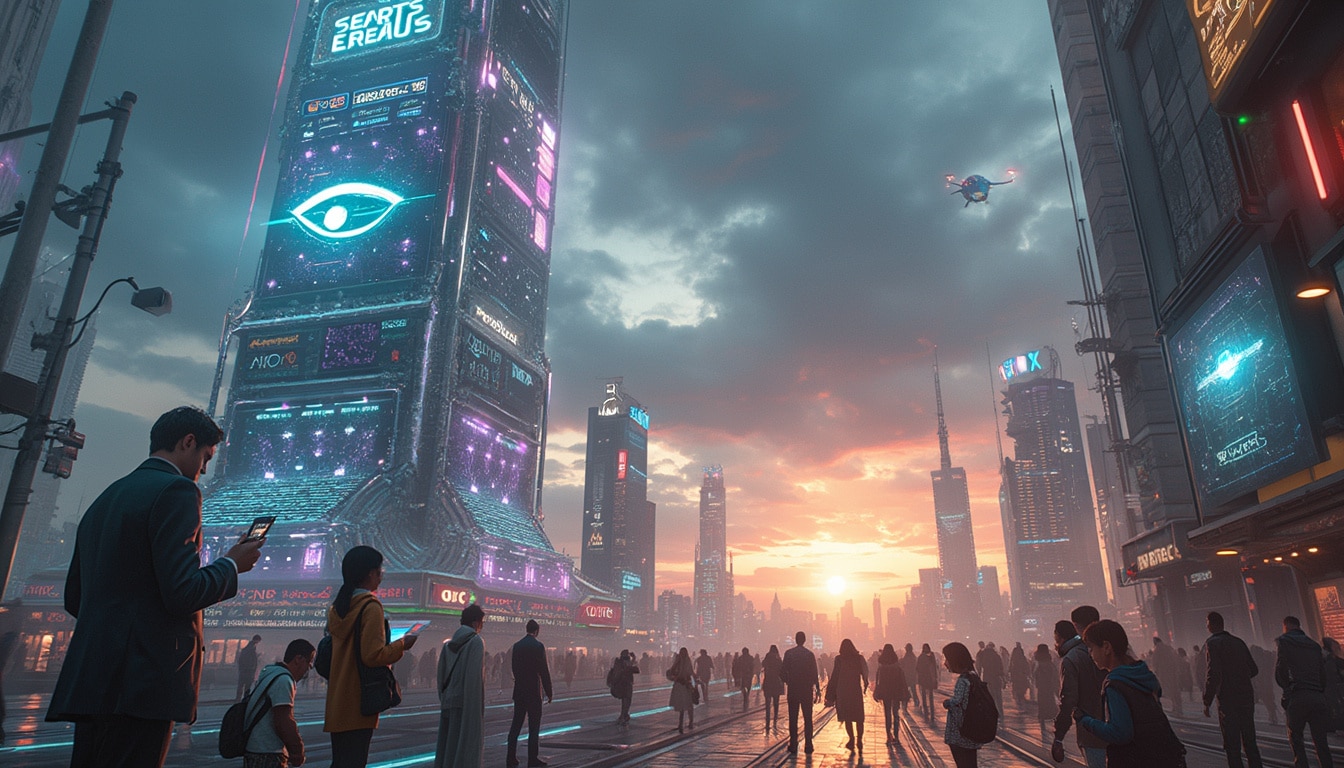« `html
Google is about to flip the script on how we use search engines. With the introduction of AI Mode, the future of the web is undergoing a radical makeover. Say goodbye to endless lists of links and hello to instant, synthesized answers.
AI Mode isn’t just another update; it’s a game-changer that promises to redefine our online interactions. By leveraging advanced artificial intelligence, Google aims to provide users with comprehensive, well-structured responses derived from multiple sources. No longer will you need to sift through countless websites to find the information you seek. Whether you’re hunting for the best local events or the top-rated Italian restaurants for your next getaway, AI Mode has got you covered.
The rise of generative AI has already transformed how we engage with the internet, and AI Mode takes this evolution a step further. Instead of presenting a list of links, the tool compiles and synthesizes data to deliver a cohesive answer right at your fingertips. This means faster, more efficient searches, allowing you to access the information you need without the hassle of comparing different sites.
However, this innovation isn’t without its downsides. For everyday users, AI Mode offers unparalleled convenience, streamlining the search process and saving valuable time. But for content creators, the impact is less favorable. Websites, blogs, and online communities that rely on user engagement and clicks may see a significant drop in traffic as AI Mode extracts and summarizes their content without directing users back to the original sources.
Looking ahead, there’s a growing concern about the long-term effects of AI Mode on the richness of the internet. As the tool becomes more prevalent, the incentive to produce unique and diverse content might diminish, leading to a potential decline in the variety and depth of information available online. This homogenization of content could make the web feel less vibrant and more standardized, stripping away the unique voices and perspectives that make the internet so dynamic.
Moreover, the question of source credibility arises with AI Mode. Determining which sources the AI prioritizes and how it assesses their reliability is crucial. If the algorithm favors certain types of content over others, it could inadvertently silence niche voices and alternative viewpoints, shaping the information landscape in ways we can’t yet predict.
In essence, while AI Mode offers exciting advancements for user experience, it also poses significant challenges for the ecosystem of online content. Balancing these benefits and drawbacks will be key to ensuring that the web remains a diverse and human-centric space.
« `html
Hey there, internet explorers! Ever felt like your trusty old Google is getting a turbocharged makeover? Well, buckle up because AI Mode is here to shake things up. But is this the dawn of a new era or the twilight of our beloved search engine? Let’s dive into this digital drama!
Table of contents
Togglewhat exactly is ai mode and how does it differ from traditional search?
Remember the days when a simple query on Google would spit out a laundry list of links? Enter AI Mode, Google’s latest brainchild designed to revolutionize the way we search. Unlike the traditional method, AI Mode compiles information from various sources and delivers a synthesized response directly on the search results page. Imagine having a witty journalist (like yours truly, Josh) give you a neat summary without the need to click through a dozen tabs.
This isn’t just a minor tweak; it’s a paradigm shift. Instead of browsing through multiple websites, AI Mode aims to provide comprehensive answers instantly. Whether you’re hunting for weekend events or the best Italian restaurant for your next trip, AI Mode handles the heavy lifting, offering you a polished, ready-to-consume answer in record time.
how does ai mode impact user experience?
For users, AI Mode is like having a personal assistant that fetches information tailored to your queries swiftly and efficiently. No more sifting through endless search results or debating which link holds the truth. AI Mode’s ability to synthesize data from multiple sources means that answers are not only faster but also more organized.
But it’s not all sunshine and rainbows. While the convenience is undeniable, there’s a catch. The simplicity of having all answers served up in a neatly packaged format might lead to a reduction in the diversity of information consumed. After all, with everything handed to you on a silver platter, the serendipitous discovery of new sites and perspectives is at risk of fading away.
what are the implications for content creators?
Here’s where the plot thickens. For content creators, AI Mode is both a blessing and a curse. On one hand, your meticulously crafted content might reach a broader audience through AI’s synthesized answers. On the other hand, the very essence of driving traffic to your site could diminish.
Websites, blogs, and community forums rely heavily on user clicks to sustain their operations. With AI Mode extracting and summarizing content, the visibility and traffic to these platforms could see a significant decline. This shift not only threatens the livelihoods of many creators but also risks creating a content landscape that is less vibrant and diverse.
can ai mode lead to the demise of traditional search engines?
The big question: Is AI Mode the harbinger of the end for traditional search engines like we know them? In a way, yes. By fundamentally altering how information is retrieved and consumed, AI Mode challenges the very core of what search engines do.
However, it’s unlikely that traditional search engines will disappear overnight. Instead, we might witness a gradual transformation where AI-integrated search becomes the new norm, coexisting with traditional methods. The real demise might not be of Google itself, but of the conventional search paradigms that have been around since the dawn of the internet.
what are the potential risks associated with ai mode?
With great power comes great responsibility, and AI Mode is no exception. One of the primary concerns is the accuracy of the synthesized information. As highlighted in an AI research, error rates can be alarmingly high, leading to the dissemination of misinformation.
Moreover, the lack of transparency in how AI Mode selects and prioritizes sources raises questions about bias and fairness. If certain voices are systematically overshadowed by others deemed more credible by opaque algorithms, the internet could become a less inclusive and more homogenized space.
how does ai mode affect the quality of information?
AI Mode promises efficiency, but what about the depth and quality of information? By condensing data into brief summaries, there’s a risk of oversimplification, stripping away the nuances and complexities that make information rich and valuable.
Moreover, relying heavily on AI to filter and present information can lead to a standardized format that may lack the originality and creativity that different content creators bring to the table. This homogenization could make the web feel like a bland buffet where everything tastes remarkably similar.
will ai mode dehumanize the internet?
Here’s a thought-provoking angle: Could AI Mode lead to the dehumanization of the internet? The charm of the web lies in its diversity and the unique voices that contribute to it. With AI Mode serving pre-packaged answers, the personal touch and the organic interactions that make the internet vibrant might diminish.
Imagine stumbling upon a captivating blog post or engaging in a lively forum discussion—moments that foster a sense of community and connection. AI Mode’s streamlined responses could bypass these enriching experiences, making the internet feel more transactional and less personable.
what do experts say about ai mode’s future?
Not everyone is convinced that AI Mode is a game-changer for the better. Some experts argue that while AI Mode enhances user convenience, it also poses significant challenges for content diversity and credibility. As @JoannaStern pointed out regarding French dubbing, the human element in content creation is irreplaceable.
Further criticism highlights the potential for AI Mode to prioritize speed over accuracy, leading to the propagation of unverified or superficial information. As discussions around AI image generation heat up, the debate over AI’s role in shaping our digital landscape continues to intensify.
how can users adapt to the rise of ai mode?
Adaptation is key in the ever-evolving digital world. Users can take proactive steps to navigate the changes brought by AI Mode. One effective strategy is to diversify information sources. Relying solely on AI-generated answers might limit exposure to different perspectives and depths of information.
Additionally, developing critical thinking skills becomes even more crucial. Users should approach AI Mode’s responses with a healthy dose of skepticism, cross-referencing information with trusted sources to ensure accuracy and comprehensiveness. Embracing a balanced approach can help mitigate the risks associated with AI Mode’s dominance.
what does the future hold for search engines?
The integration of AI like AI Mode signals a transformative future for search engines. Rather than rendering traditional search obsolete, it’s more likely that search engines will evolve, blending the best of both worlds: the efficiency of AI with the richness of traditional search methods.
Future search engines might offer more personalized and interactive experiences, leveraging AI to understand user intent better while maintaining the diverse and expansive nature of the web. Innovations such as voice search, visual search, and augmented reality could further redefine how we interact with information online.
share the article:
Enjoyed this deep dive into AI Mode? Share it with your friends and stay ahead in the digital age!














